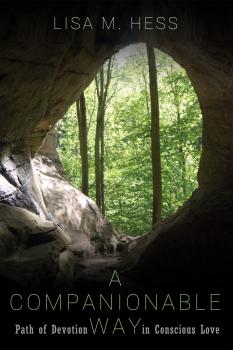ТОП просматриваемых книг сайта:















Lisa M. Hess
Список книг автора Lisa M. HessАннотация
Paradox and surprise face those who pursue deeper spiritual practice, theological wisdom, and even a religious calling «into the ministry.» Unbeknownst to incoming students, the pursuit of theological education in established institutions today furthers a faith that is recognizable in delight and compassion, even as it may just as easily deform it into a moral duty and autonomous professionalism so divisive in today's religious ecology. How may those drawn into ministry formation today receive its deep theological treasures and sustain a vibrant faith with a theologically expressive delight able to companion the suffering of self and others?
Artisanal Theology explores the paradoxes and surprises that await those walking in the worlds of theological education–the local congregation, the academy, the tradition/denomination. Part handbook, part witness, it offers guidance for the path of intentional formation within contemporary institutions of theological education, whose riches may be mined in a disciplined spiritual stewardship and grounded in radically covenantal companionship. Just like artisanal bread blends the classical methods of bread-baking with modern conveniences, so an artisanal theology relies upon the personal and communal touch of human relationship amidst the contemporary forms of programmatic theological education. An artisanal theology offers an articulate and traditionally-rooted faith perspective grounded in covenantal companionships sustained in contexts of church, tradition, and, most importantly, practice. Ultimately, an artisanal theology witnesses beyond the anticipated political divides to the Triune God-among-us, known in a theologically expressive delight, able to companion the suffering of self and others.
Artisanal Theology explores the paradoxes and surprises that await those walking in the worlds of theological education–the local congregation, the academy, the tradition/denomination. Part handbook, part witness, it offers guidance for the path of intentional formation within contemporary institutions of theological education, whose riches may be mined in a disciplined spiritual stewardship and grounded in radically covenantal companionship. Just like artisanal bread blends the classical methods of bread-baking with modern conveniences, so an artisanal theology relies upon the personal and communal touch of human relationship amidst the contemporary forms of programmatic theological education. An artisanal theology offers an articulate and traditionally-rooted faith perspective grounded in covenantal companionships sustained in contexts of church, tradition, and, most importantly, practice. Ultimately, an artisanal theology witnesses beyond the anticipated political divides to the Triune God-among-us, known in a theologically expressive delight, able to companion the suffering of self and others.
Аннотация
Learning in a Musical Key examines the multidimensional problem of the relationship between music and theological education. Lisa Hess argues that, in a delightful and baffling way, musical learning has the potential to significantly alter and inform our conception of the nature and process of theological learning. In exploring this exciting intersection of musical learning and theological training, Hess asks two probing questions. First, What does learning from music in a performative mode require? Classical modes of theological education often founder on a dichotomy between theologically musical and educational discourses. It is extremely difficult for many to see how the perceivedly nonmusical learn from music. Is musicality a universally human potential? In exploring this question Hess turns to the music-learning theory of Edwin Gordon, which explores music's unique mode of teaching/learning, its primarily aural-oral mode.
This challenge leads to the study's second question: How does a theologian, in the disciplinary sense, integrate a performative mode into critical discourse? Tracking the critical movements of this problem, Hess provides an inherited, transformational logic as a feasible path for integrating a performative mode into multidimensional learning. This approach emerges as a distinctly relational, embodied, multidimensional, and non-correlational performative-mode theology that breaks new ground in the contemporary theological landscape. As an implicitly trinitarian method, rooted in the relationality of God, this non-correlational method offers a practical theological contribution to the discipline of Christian spirituality, newly claimed here as a discipline of transformative teaching/learning through the highly contextualized and self-implicated scholar into relationally formed communities, and ultimately into the world.
This challenge leads to the study's second question: How does a theologian, in the disciplinary sense, integrate a performative mode into critical discourse? Tracking the critical movements of this problem, Hess provides an inherited, transformational logic as a feasible path for integrating a performative mode into multidimensional learning. This approach emerges as a distinctly relational, embodied, multidimensional, and non-correlational performative-mode theology that breaks new ground in the contemporary theological landscape. As an implicitly trinitarian method, rooted in the relationality of God, this non-correlational method offers a practical theological contribution to the discipline of Christian spirituality, newly claimed here as a discipline of transformative teaching/learning through the highly contextualized and self-implicated scholar into relationally formed communities, and ultimately into the world.
Аннотация
In today's polarized publics, we are rarely prepared to encounter one another peaceably and deeply across irreconcilable difference. A Companionable Way invites inquisitive minds, body-souls, and spiritual hearts into the delightful but demanding inner work required for peaceable encounters with integrity across interreligious and intercultural difference. Unmet yearnings and the unconscious refusal of deep feeling in so many of our cultures need redress, not only within scholarly-analytical habits of mind but also in aging communal «containers» not adept at holding deep feeling without harm. Ancient but 'new' containers today–webs of spiritual friendship and circle-way communities of practice–offer hope for new learning and formative encounters with difference toward an expressive delight able to companion the suffering of self and others. Part memoir of a deep-feeling academic, part toolbox for the curiously contemplative, A Companionable Way witnesses to the deeply rooted Sacred available to each of us in a return to the body, devotion in conscious love, and new ways of being human together across irreconcilable difference, held gently in a patient and living wisdom particular to each but needed by all.



